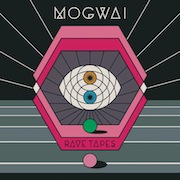Satan aside, it seems like Mogwai’s current fear is a slack work ethic. Last year, as well as revisiting their soundtrack to Zidane for a run of live performances, they released their soundtrack to the French zombie drama Les Revenants, and now, less than 12 months down the line, out of the Castle Of Doom emerges their eighth studio album, the concise, eclectic and characteristically misleadingly-titled Rave Tapes.
In places, it’s a record that surveys and refines their back catalogue. (This is not a criticism; when you’ve got a canon of songs as fine in quality and uncanny of name as theirs, you’d be foolish not to). For starters, there’s the burnished rock of Hardcore Will Never Die, But You Will in ‘Hexon Bogon’, which gets followed by Young Team‘s obscure vocal sampling on ‘Repelish’. There, a powerfully earnest commentary on ‘Stairway To Heaven’ – originally delivered on a Christian radio station in the US, and given an impressively straight-faced re-recording for the album – gets set to a serious guitar music backing, wringing out the gem-like beauty in lines such as: "’she’s buying the stairway to heaven’: we know that’s not possible".
But there’s evolution here too. If there is any nod to rave, you might find it in Barry Burns’ newly-acquired modular synths, deployed with devastating effect on ‘Remurdered’. A cyclical keyboard riff lifts up out of the tense undertow of guitars, forging a prelude of pure menace to the gloriously mechanistic synth line that seeks through the track from the halfway mark, marshalling every other element under its wing until it kills them off one by one. The individual parts wouldn’t suggest it, but taken as a whole, the track’s a banger, re-channeling some of the dark glee of ‘Like Herod’ and ‘I Know You Are But What Am I?’ and forcing it down a Kraftwerkian network of gothic, sinewy synths.
Elsewhere, ‘Heard About You Last Night’, picks up the expanded instrumentation on Les Revenants, opening the album with ringing hits on tuned percussion, working through to the aerated, mid-pace stride the band do so well and twice reaching up to martial cascades of piano notes fluttering down, abetted by Paul Savage’s production, which gives each finely thought-through musical detail its share of space to unfurl.
As much, though, as Mogwai’s calling card – more live than on record, it must be said – has always been their ability to tap into the fury and the rage, this has also come with a simultaneous sense of righteous, almost uplifting strength and solidity. Happy Songs For Happy People‘s ‘Stop Coming To My House’ grows like an all-crushing tidal wave, but by the end of it you feel aspirated rather than pummelled into the ground (though you would, in all likelihood, stop going to their house). And, to combat a couple of misfiring cuts on the album, the meandering, overlong ‘Simon Ferocious’ and the dynamically-underfed ‘Deesh’, it feels like this is the place the album ascends to in its magnificent closing trio of tracks.
First is ‘Blues Hour’, one of the album’s undeniable high points. The sole track to feature sung vocals, it finds Stuart Braithwaite reprising his paced, deliberate delivery over a controlled surge; the clean-limbed bass winding around gorgeously sparse piano and stately drums, before a familiar maelstrom of shredded guitar rears up. Not only is it an instant high point of the record, but it gets better each time (wear headphones). ‘No Medicine For Regret’ opens on a hymnal organ sequence which gets overlaid by needling guitar and flickering, spidery synth, also moving to a mammoth guitar-wall, surely laying the foundations for some monstrous cochlea-battering live. ‘The Lord Is Out Of Control’, finally, has Burns morphing his voice through a vocoder over an undulating, waltzing rhythm, the band’s brute force transmuted, as it frequently is, into a kind of gentle heaviness to close the album.
To go back to ‘Blues Hour’, part of its immediacy, perhaps, is that it feels like a cousin to Come On Die Young‘s ‘Cody’, one of the band’s finest moments. On first hearing, the lyrics seem unbearably bleak, the spectre of death lingering in, "My ghost is always hungry" and "We’ll leave this world just as we found it", all hooked around a chorus of, "Train lines, going nowhere/ No destination found". It pushes further the feeling of movement that procures nothing but stasis that left the figure in ‘Cody’ driving alone at night, past streetlight fairgrounds and Day-Glo road signs. Yet at the same time, these lines are mapped onto the glorious upsurge of the music, the music’s evident direction redeeming the apparent hopelessness. It’s tempting, and maybe even likely, that the title, ‘Blues Hour’, actually does relate to the song this time, a piss-take before things get too morose. And this is why Mogwai remain a potent and necessary force. Few bands are able to strike a balance and a tension – dealing out, particularly in the live arena, a comprehensive aural gutting, but rendering it in awe-inspiring sonic terms; making serious, frequently beautiful instrumental music without making it too serious – that Mogwai have made their own, and something which gets distilled in ‘Blues Hour’. Rave Tapes may not be their definitive album, and even if that never comes, it adds another clutch of undeniably brilliant songs to their arsenal. The hawk is very much still howling.


